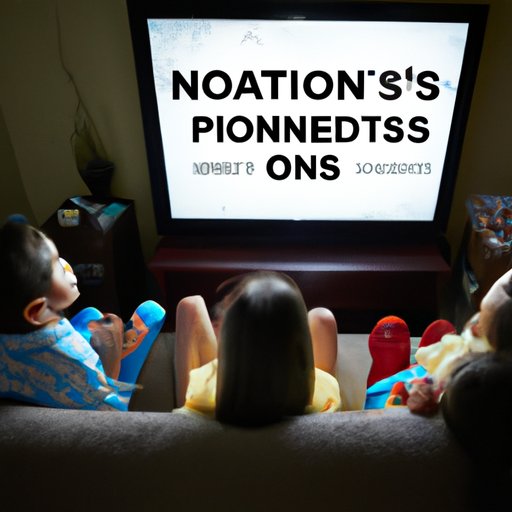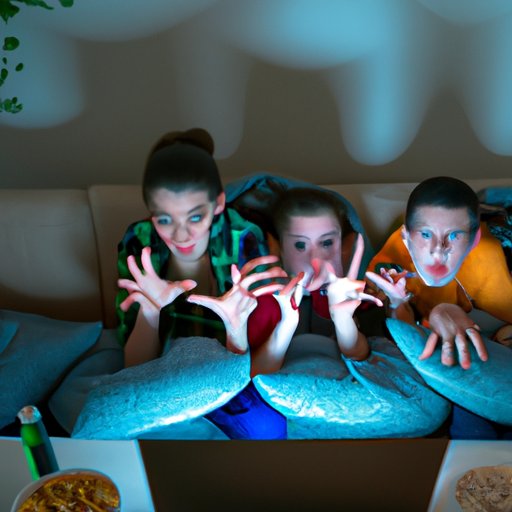Introduction
Horror movies are films that provoke fear and dread in viewers by using a combination of suspense, violence, and shock. They typically contain elements of supernatural or science fiction, such as ghosts, monsters, aliens, and zombies. In recent years, horror movies have become increasingly popular among children and teenagers, leading many parents to question whether these types of films are suitable for young viewers.
This article will explore the pros and cons of allowing kids to watch horror movies, evaluating their potential impact on children’s mental health and development. We will also examine parental perspectives on allowing kids to watch horror movies, including considerations of age appropriateness, parental supervision, and setting limits. Finally, we will compare age-appropriate horror movies with adult horror movies to better understand the content differences.

Exploring Pros and Cons of Kids Watching Horror Movies
When it comes to deciding whether or not to let kids watch horror movies, there are both benefits and risks to consider. Let’s take a closer look at some of the advantages and disadvantages of allowing children to watch these types of films.
Benefits of Horror Movies
Despite the potentially frightening nature of horror movies, there are several psychological benefits associated with watching them. Here are just a few of the ways that horror movies can be beneficial for kids:
Increase in Emotional Intelligence
Horror movies can help kids develop emotional intelligence by teaching them how to recognize and respond to emotions in themselves and others. By watching characters experience fear, joy, sadness, and anger, kids can gain insight into their own emotions and those of others.
Improved Creativity
Horror movies can also foster creativity in kids by inspiring them to come up with unique ideas and solutions to problems. For example, after watching a horror movie, kids might be motivated to create their own scary stories or draw pictures of their favorite monster.
Development of Critical Thinking Skills
Horror movies can also help kids develop critical thinking skills by forcing them to analyze the events in the movie and come up with logical explanations. This can help them become better problem solvers in other areas of their lives.
Risks of Horror Movies
While there are some benefits associated with watching horror movies, there are also some potential risks that parents should be aware of. Here are some of the ways that horror movies can be harmful for kids:
Desensitization to Violence
One of the most common concerns about horror movies is that they may desensitize kids to violence. By repeatedly watching scenes of graphic violence, kids may become less sensitive to the consequences of violence in real life.
Nightmares and Anxiety
Another risk of horror movies is that they can cause nightmares and anxiety in kids. The intense fear and suspense in horror movies can stay with kids even after the movie has ended, resulting in restless nights and feelings of unease.
Difficulty Differentiating Between Reality and Fiction
Finally, horror movies can make it difficult for kids to differentiate between reality and fiction. After watching a horror movie, kids may start to believe that supernatural creatures exist in the real world, which can lead to confusion and irrational fears.
Examining the Impact of Horror Movies on Children’s Mental Health
In addition to the immediate risks mentioned above, horror movies can also have long-term effects on children’s mental health. Let’s take a closer look at some of the ways that horror movies can affect kids’ mental wellbeing.
Immediate Effects
The most common immediate effects of horror movies on children are increased fear and behavioral problems. After watching a horror movie, kids may be more likely to display aggressive behavior or have trouble sleeping.
Long-Term Effects
Over time, exposure to horror movies can lead to more serious mental health issues. Studies have shown that kids who watch horror movies are at an increased risk of developing mental illness, such as depression and anxiety. Additionally, kids may develop a negative perception of the world, believing that danger lurks around every corner.
Investigating Parental Perspectives on Allowing Kids to Watch Horror Movies
Given the potential risks associated with horror movies, it’s understandable that many parents are hesitant to allow their kids to watch them. However, there are several factors that parents should consider when deciding whether or not to let their kids watch horror movies.
Age Appropriateness
One of the most important considerations is age appropriateness. Generally speaking, younger kids should avoid watching horror movies altogether, while older kids may be able to handle certain types of horror movies if they are supervised by an adult.
Parental Supervision
It’s also important for parents to supervise their kids while they are watching horror movies. This will ensure that kids are not exposed to inappropriate content and can help parents address any questions or concerns that arise.
Setting Limits
Finally, it’s important for parents to set limits on how much horror their kids are allowed to watch. Parents should also monitor their kids’ reactions to horror movies and stop watching if their kids become too scared or anxious.
Analyzing the Effects of Horror Movies on Kids’ Developing Brains
In addition to the psychological effects of horror movies, there are also physiological effects that parents should be aware of. Let’s take a closer look at how horror movies can impact kids’ developing brains.
Physiological Effects
One of the most common physiological effects of horror movies on kids is an increase in stress hormones. Exposure to intense fear can trigger the release of adrenaline and cortisol, resulting in physical symptoms such as increased heart rate and sweating.
Additionally, horror movies can affect memory formation in kids. While watching a horror movie, kids may be more likely to remember negative images and experiences than positive ones.
Psychological Effects
Horror movies can also have psychological effects on kids. For example, watching horror movies can impair kids’ ability to regulate their emotions, leading to heightened levels of fear and anxiety.
Additionally, horror movies can reduce cognitive flexibility in kids. By repeatedly exposing kids to the same type of fear, horror movies can limit their ability to think outside the box and come up with creative solutions to problems.
Comparing Age-Appropriate Horror Movies vs. Adult Horror Movies
When deciding whether or not to let their kids watch horror movies, parents should also consider the content differences between age-appropriate and adult horror movies. Let’s take a closer look at these differences.
Content Differences
The main difference between age-appropriate and adult horror movies is the level of violence and gore. Age-appropriate horror movies tend to be less graphic and focus more on suspense and psychological horror, while adult horror movies often contain graphic violence and explicit language.
Age-Appropriate Movies
When selecting age-appropriate horror movies for kids, parents should look for films that focus on suspense and psychological horror rather than gore and violence. Some examples of age-appropriate horror movies include “Coraline”, “Goosebumps”, and “Monster House”.
Parental Discretion
Ultimately, the decision to let kids watch horror movies is up to the parents. Parents should use their discretion to determine what types of horror movies are appropriate for their kids, taking into account their ages, maturity levels, and individual preferences.
Conclusion
In conclusion, horror movies can have both benefits and risks for kids. While they can help kids develop emotional intelligence and critical thinking skills, they can also lead to desensitization to violence, nightmares and anxiety, and difficulty differentiating between reality and fiction. Additionally, horror movies can have long-term effects on kids’ mental health, including an increased risk of developing mental illness and a negative perception of the world.
When deciding whether or not to let their kids watch horror movies, parents should consider age appropriateness, parental supervision, and setting limits. They should also be aware of the content differences between age-appropriate and adult horror movies. Ultimately, the decision is up to the parents and should be based on their individual discretion.
(Note: Is this article not meeting your expectations? Do you have knowledge or insights to share? Unlock new opportunities and expand your reach by joining our authors team. Click Registration to join us and share your expertise with our readers.)
